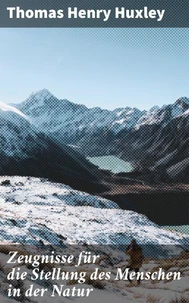Science & Education. Essays
Par :Formats :
Disponible dans votre compte client Decitre ou Furet du Nord dès validation de votre commande. Le format ePub est :
- Compatible avec une lecture sur My Vivlio (smartphone, tablette, ordinateur)
- Compatible avec une lecture sur liseuses Vivlio
- Pour les liseuses autres que Vivlio, vous devez utiliser le logiciel Adobe Digital Edition. Non compatible avec la lecture sur les liseuses Kindle, Remarkable et Sony
 , qui est-ce ?
, qui est-ce ?Notre partenaire de plateforme de lecture numérique où vous retrouverez l'ensemble de vos ebooks gratuitement
Pour en savoir plus sur nos ebooks, consultez notre aide en ligne ici
- Nombre de pages306
- FormatePub
- ISBN859-65--4736118-3
- EAN8596547361183
- Date de parution16/09/2022
- Protection num.Digital Watermarking
- Taille538 Ko
- Infos supplémentairesepub
- ÉditeurDIGICAT
Résumé
In "Science & Education, " Thomas Henry Huxley passionately advocates for the integration of scientific inquiry into educational practices, emphasizing the importance of a curriculum grounded in empirical evidence and critical thinking. Written with clarity and precision, Huxley navigates the dichotomy between scientific knowledge and traditional education, advocating for a model that embraces a progressive approach to learning.
His work emerges from the context of the late 19th century-a time when the scientific method began to influence broader intellectual discourse, and Huxley's rhetoric eloquently reflects the tension between religious dogma and emerging empiricism. Huxley, often called "Darwin's Bulldog" for his vigorous defense of Darwinian evolution, was a prominent biologist and educator whose work shaped the foundations of modern science education.
His own struggle with Victorian educational norms and his commitment to instilling scientific literacy in society, especially for the young, underscored his motivations for writing this seminal text. His broad understanding of biology, coupled with his belief in rational thought and skepticism, informs every page of this work. "Science & Education" is essential reading for educators, scientists, and anyone invested in the cultivation of a scientifically literate society.
Huxley's insights remain strikingly relevant as they encourage readers to reconsider the role of education in fostering critical thinking and understanding of the natural world. This book not only reflects Huxley's vision but also challenges us to prioritize scientific education in an era where misinformation can proliferate.
His work emerges from the context of the late 19th century-a time when the scientific method began to influence broader intellectual discourse, and Huxley's rhetoric eloquently reflects the tension between religious dogma and emerging empiricism. Huxley, often called "Darwin's Bulldog" for his vigorous defense of Darwinian evolution, was a prominent biologist and educator whose work shaped the foundations of modern science education.
His own struggle with Victorian educational norms and his commitment to instilling scientific literacy in society, especially for the young, underscored his motivations for writing this seminal text. His broad understanding of biology, coupled with his belief in rational thought and skepticism, informs every page of this work. "Science & Education" is essential reading for educators, scientists, and anyone invested in the cultivation of a scientifically literate society.
Huxley's insights remain strikingly relevant as they encourage readers to reconsider the role of education in fostering critical thinking and understanding of the natural world. This book not only reflects Huxley's vision but also challenges us to prioritize scientific education in an era where misinformation can proliferate.
In "Science & Education, " Thomas Henry Huxley passionately advocates for the integration of scientific inquiry into educational practices, emphasizing the importance of a curriculum grounded in empirical evidence and critical thinking. Written with clarity and precision, Huxley navigates the dichotomy between scientific knowledge and traditional education, advocating for a model that embraces a progressive approach to learning.
His work emerges from the context of the late 19th century-a time when the scientific method began to influence broader intellectual discourse, and Huxley's rhetoric eloquently reflects the tension between religious dogma and emerging empiricism. Huxley, often called "Darwin's Bulldog" for his vigorous defense of Darwinian evolution, was a prominent biologist and educator whose work shaped the foundations of modern science education.
His own struggle with Victorian educational norms and his commitment to instilling scientific literacy in society, especially for the young, underscored his motivations for writing this seminal text. His broad understanding of biology, coupled with his belief in rational thought and skepticism, informs every page of this work. "Science & Education" is essential reading for educators, scientists, and anyone invested in the cultivation of a scientifically literate society.
Huxley's insights remain strikingly relevant as they encourage readers to reconsider the role of education in fostering critical thinking and understanding of the natural world. This book not only reflects Huxley's vision but also challenges us to prioritize scientific education in an era where misinformation can proliferate.
His work emerges from the context of the late 19th century-a time when the scientific method began to influence broader intellectual discourse, and Huxley's rhetoric eloquently reflects the tension between religious dogma and emerging empiricism. Huxley, often called "Darwin's Bulldog" for his vigorous defense of Darwinian evolution, was a prominent biologist and educator whose work shaped the foundations of modern science education.
His own struggle with Victorian educational norms and his commitment to instilling scientific literacy in society, especially for the young, underscored his motivations for writing this seminal text. His broad understanding of biology, coupled with his belief in rational thought and skepticism, informs every page of this work. "Science & Education" is essential reading for educators, scientists, and anyone invested in the cultivation of a scientifically literate society.
Huxley's insights remain strikingly relevant as they encourage readers to reconsider the role of education in fostering critical thinking and understanding of the natural world. This book not only reflects Huxley's vision but also challenges us to prioritize scientific education in an era where misinformation can proliferate.



